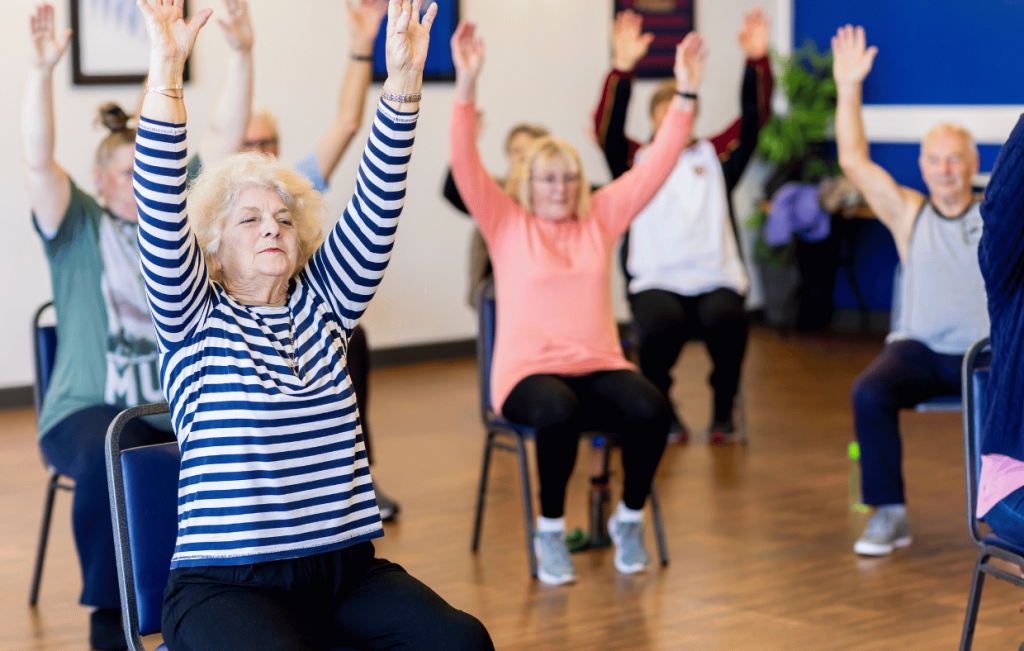Dementia is a progressive condition that affects millions of seniors worldwide, causing cognitive decline, emotional challenges, and physical limitations. Let’s engage in all stimulating activities for seniors with dementia.
Tailored activities can play a vital role in enhancing the quality of life for seniors at different stages of dementia. These activities help maintain cognitive function and improve emotional well-being, physical health, and social engagement.
If you’re looking for proven strategies to stimulate cognitive health and brain function, you can start with this brain health resource: Neurozoom Brain Health Quiz.
The Importance of Activities for Seniors With Dementia
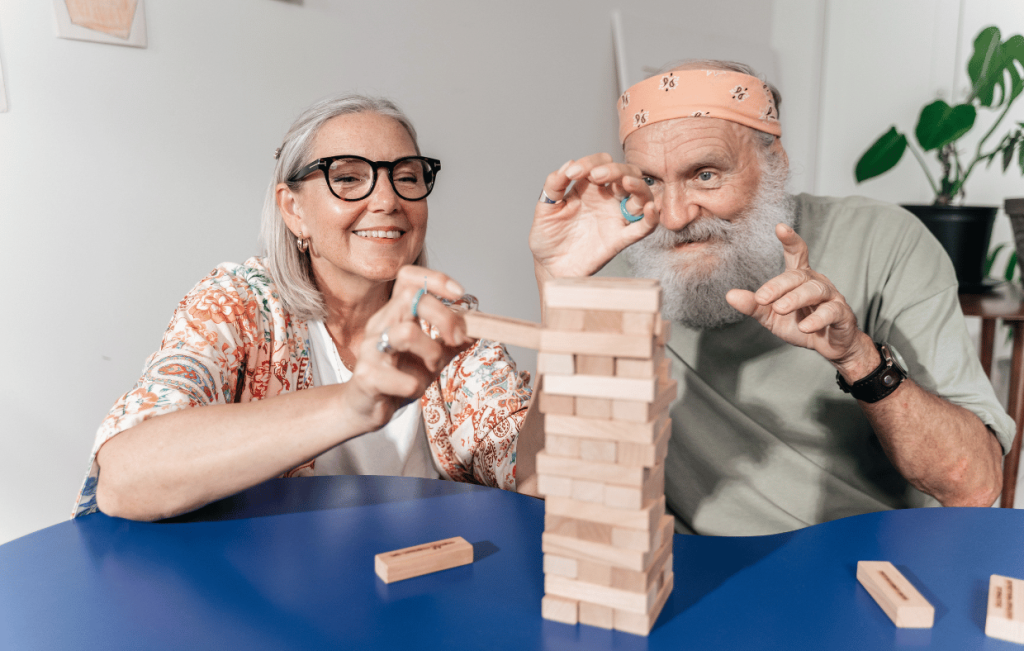
Stimulating activities are essential for seniors with dementia to maintain a sense of purpose and connection. They offer several key benefits:
- Slow Cognitive Decline: Activities that stimulate the brain help maintain cognitive abilities, particularly in the early stages of dementia.
- Emotional Well-Being: Participating in meaningful or fun activities fosters joy, reduces anxiety, and strengthens emotional connections.
- Physical Health: Regular exercise promotes mobility, balance, and overall health.
- Social Engagement: Social activities reduce feelings of isolation and encourage seniors to interact with loved ones or peers.
Choosing the right activities depends on the individual’s stage of dementia, abilities, and preferences. A variety of cognitive, physical, sensory, and social activities can address these needs effectively.
Early Stages of Dementia: Cognitive and Social Activities
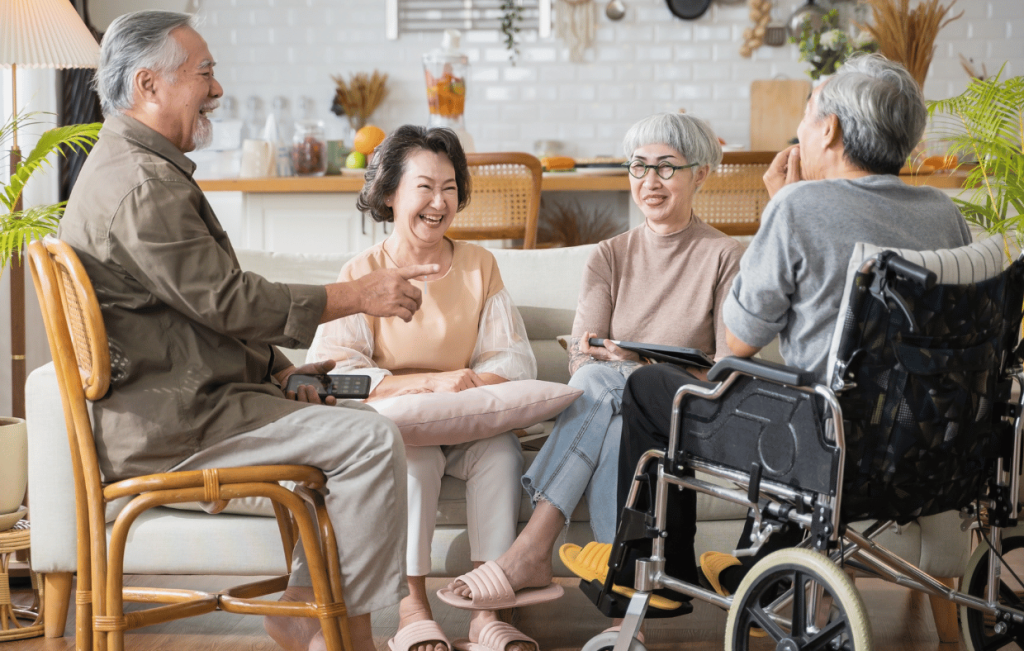
In the early stages, seniors may still retain some cognitive skills and benefit from activities that stimulate memory, thinking, and social interaction.
Cognitive Activities
These activities focus on keeping the brain active:
- Puzzles and Brain Teasers: Sudoku, jigsaw puzzles, and crossword puzzles can help maintain problem-solving abilities.
- Memory Games: Matching cards, word games, or using flashcards encourages recall and strengthens cognitive abilities.
- Creative Activities: Simple tasks like painting, drawing, or crafting promote focus and creativity.
Social Activities
Maintaining social interaction is crucial during this stage:
- Group Discussions: Encourage seniors to share stories or opinions on familiar topics.
- Storytelling and Book Clubs: Reading and storytelling help stimulate imagination and memory.
- Looking Through Familiar Objects: Going through family albums or keepsakes can spark emotional connections and long-term memories.
Meaningful Activities
Activities with personal significance promote a sense of purpose:
- Assisting with small tasks like folding laundry or setting the table.
- Gardening or caring for indoor plants.
- Cooking or baking familiar recipes.
For seniors in memory care programs, these activities provide essential support to delay cognitive decline and encourage social engagement.
Physical Activities for Dementia Patients

Physical activity is not only vital for overall health but also beneficial for cognitive stimulation. It reduces restlessness, promotes better sleep, and strengthens physical health.
Gentle Exercise
Physical activities should be adapted to the abilities of seniors with dementia:
- Walking: Taking daily walks improves circulation and promotes calmness.
- Chair Yoga or Light Stretching: Gentle movements improve flexibility and reduce stiffness.
- Dancing to Familiar Songs: Music paired with movement stimulates both physical and emotional well-being.
Outdoor Activities

Outdoor activities encourage sensory stimulation and interaction with nature:
- Gardening: Planting flowers or watering plants offers a calming, purposeful activity.
- Nature Walks: Observing birds, listening to the wind, or enjoying fresh air enhances sensory engagement.
- Picnics in Parks: Spending time with loved ones outdoors promotes social interaction.
Simple Tasks
Incorporate physical movement into everyday tasks:
- Sweeping, dusting, or organizing small spaces.
- Carrying light objects or arranging shelves.
Regular physical exercise helps dementia patients feel grounded while supporting mobility and reducing anxiety.
Sensory Activities to Stimulate the Mind

Sensory stimulation helps seniors connect to their environment through sight, sound, touch, smell, and taste. This approach is particularly effective in the later stages of dementia.
Familiar Scents
Scents have a powerful impact on memory and emotional expression:
- Lavender or Citrus: Use scented oils to create a calming environment.
- Familiar Scents from Baking: Smelling baked goods like bread or cookies can trigger happy memories.
- Flowers: Engaging with fresh flowers offers both visual and olfactory stimulation.
Familiar Songs and Sounds
Music therapy is one of the best activities for seniors with dementia:
- Play familiar songs from their youth to evoke memories and emotional responses.
- Encourage singing or gentle humming to boost mood.
- Use rhythm instruments like tambourines to engage seniors physically and mentally.
Touch-Based Activities
Simple activities that focus on the sense of touch:
- Handling soft fabrics, blankets, or textured items.
- Creating simple crafts like clay molding or finger painting.
- Massaging hands or feet with scented lotions to promote relaxation.
Sensory activities provide comfort and emotional connection, particularly for seniors in late-stage dementia.
Creative and Fun Activities to Engage Seniors
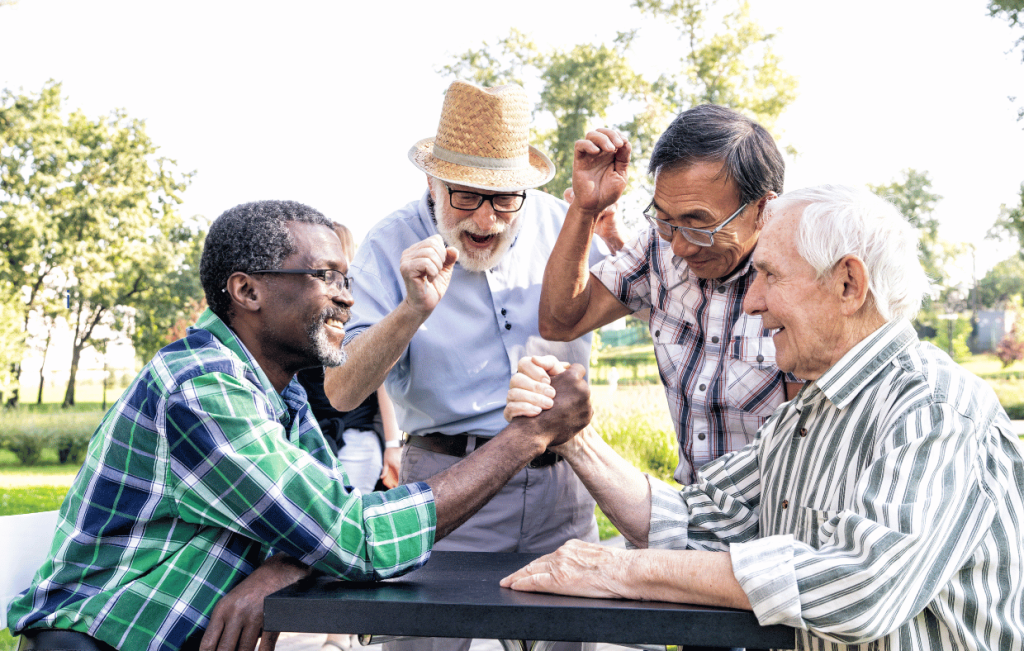
Engaging seniors in creative and fun activities can greatly enhance their emotional well-being and sense of accomplishment.
Arts and Crafts
Creative tasks offer a sense of purpose:
- Painting and Drawing: Using watercolors or colored pencils stimulates imagination.
- Simple Crafts: Activities like bead stringing, scrapbooking, or decorating objects are both fun and appropriate.
- Collage-Making: Using familiar photos or colorful materials to create meaningful art.
Music Therapy
Music is one of the most engaging activities for seniors:
- Singing or listening to familiar tunes evokes memories and joy.
- Playing simple instruments, like drums or tambourines, encourages movement and rhythm.
Games and Puzzles
Adapted games can be both stimulating and entertaining:
- Board games like checkers or bingo.
- Matching games or dominoes for cognitive stimulation.
Fun activities provide opportunities for emotional expression, creativity, and relaxation.
Outdoor and Social Activities for Emotional Expression

Social interaction and outdoor activities help dementia patients build emotional connections and maintain mental stimulation.
Outdoor Activities
- Spending time in parks or gardens offers fresh air and a calming environment.
- Observing nature, such as watching birds or picking flowers, provides sensory stimulation.
Social Activities
- Hosting small family gatherings or tea parties to encourage conversation.
- Attending community events or group programs tailored to seniors.
- Watching movies or playing games with loved ones.
These activities foster emotional well-being, reduce loneliness, and create meaningful moments.
Late-Stage Dementia: Simple and Meaningful Activities
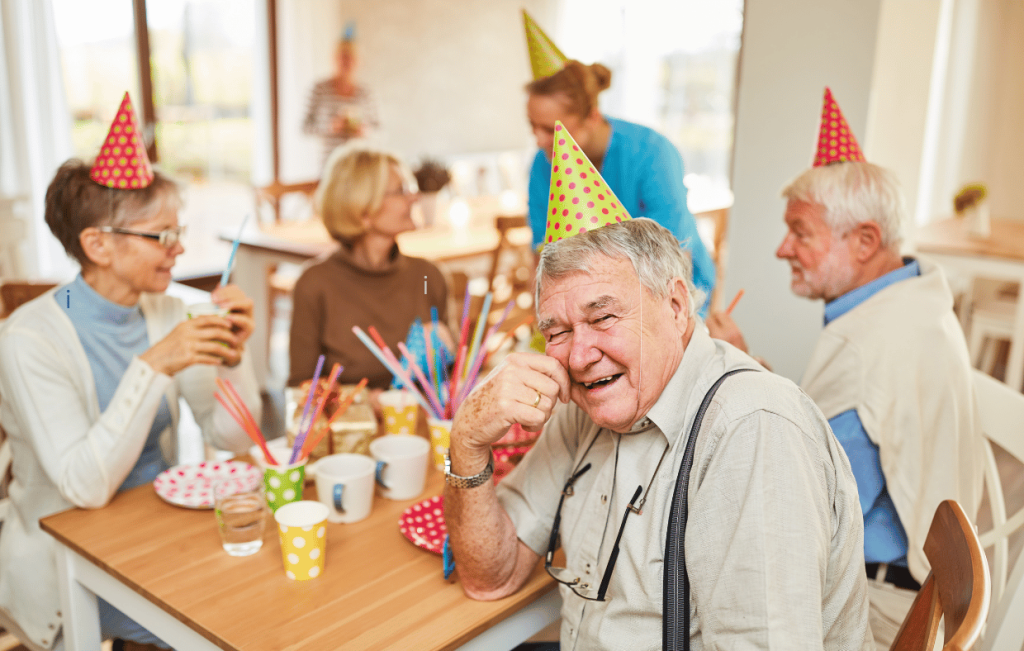
In the late stages of dementia, activities must be simple, calming, and focused on sensory stimulation.
Familiar Objects
- Holding familiar items like a favorite blanket or family heirloom provides comfort.
Familiar Scents and Sounds
- Use scents like lavender or rose to promote calmness.
- Play gentle music or familiar songs to evoke emotions.
Gentle Touch and Crafts
- Hand massages with scented oils.
- Simple crafts like painting with large brushes or molding clay.
These activities focus on emotional connection, reducing agitation, and providing comfort.
Everyday Activities for Cognitive Stimulation
Routine tasks can also provide cognitive stimulation and a sense of purpose:
- Folding clothes, sorting items, or arranging books.
- Simple cooking tasks like stirring or washing vegetables.
- Watering plants or sweeping small spaces.
Incorporating everyday activities into a routine encourages participation while maintaining dignity and independence.
Conclusion
Stimulating activities are essential for seniors with dementia to promote cognitive function, emotional connection, and physical well-being. From early stages to late-stage dementia, incorporating meaningful, sensory, physical, and creative activities can make a significant difference.
It’s important to tailor activities to individual needs and preferences. To further explore ways to support brain health and cognitive stimulation, visit: Neurozoom Brain Health Quiz.
By fostering connection, engagement, and stimulation, we can improve the lives of dementia patients and help them feel valued and loved every day.
ADDITIONAL INFORMATION
What is the best way to deal with dementia?
Caregivers play a vital role in dementia care and should prioritize their well-being:
- Self-Care: Engaging in regular physical activity, maintaining social connections, and seeking respite care when needed can help prevent caregiver burnout.
- Education and Training: Understanding dementia progression and effective communication strategies can enhance caregiving skills and reduce stress.
What is the best treatment for dementia?
While there is no cure for dementia, several treatments can alleviate symptoms and enhance quality of life:
- Medications: Cholinesterase inhibitors such as donepezil (Aricept), rivastigmine (Exelon), and galantamine (Reminyl) are commonly prescribed for mild to moderate Alzheimer’s disease. These drugs work by increasing levels of acetylcholine, a neurotransmitter associated with memory and judgment. Memantine (Namenda) is another medication used to treat moderate to severe Alzheimer’s by regulating glutamate activity to improve cognition and daily functioning.
- Non-Pharmacological Therapies: Cognitive stimulation activities, such as puzzles and memory exercises, can help maintain mental function. Physical exercise and social engagement are also beneficial in slowing cognitive decline.
- Emerging Treatments: Recent advancements include drugs like donanemab, which targets amyloid plaques in the brain to slow disease progression. However, access to such treatments may be limited due to regulatory and cost considerations.
How to promote self-care for dementia patients?
Encouraging self-care in individuals with dementia fosters independence and well-being:
- Physical Self-Care: Utilizing aids like pill organizers and meal delivery services can assist with daily tasks. Ensuring a safe environment by removing fall hazards is also crucial.
- Emotional Self-Care: Managing emotions through activities that bring joy and relaxation is important. Engaging in familiar hobbies and maintaining social connections can provide emotional support.
- Support Systems: Joining support groups offers a platform to share experiences and receive guidance, which is beneficial for both patients and caregivers.
What is the best living situation for someone with dementia?
Selecting an appropriate living environment depends on the individual’s needs and the progression of the disease:
- Home Care: In the early stages, individuals may remain at home with additional support, allowing them to stay in a familiar environment. Modifications to enhance safety, such as installing grab bars and removing tripping hazards, are essential.
- Assisted Living Facilities: For those requiring help with daily activities but desiring some independence, assisted living facilities provide necessary support. These facilities offer assistance with bathing, dressing, and medication management.
- Memory Care Units: Specialized memory care units cater to individuals with moderate to severe dementia, offering structured environments and specialized staff to manage unique challenges associated with the condition.
Managing dementia requires a multifaceted approach tailored to the individual’s needs, encompassing medical treatments, self-care strategies, appropriate living arrangements, and robust support systems for both patients and caregivers.


